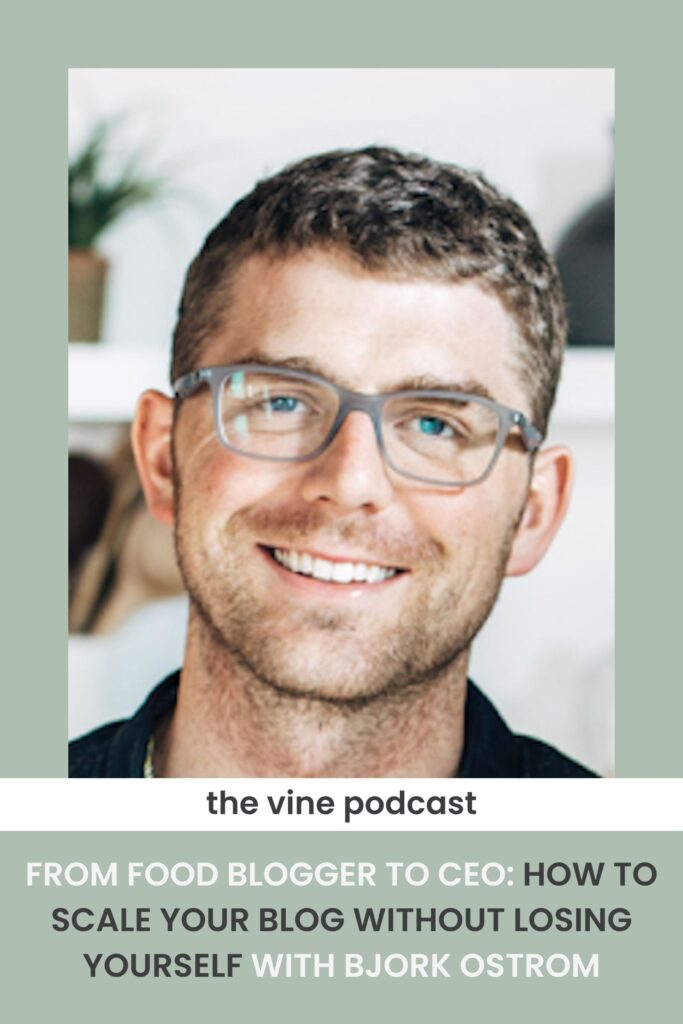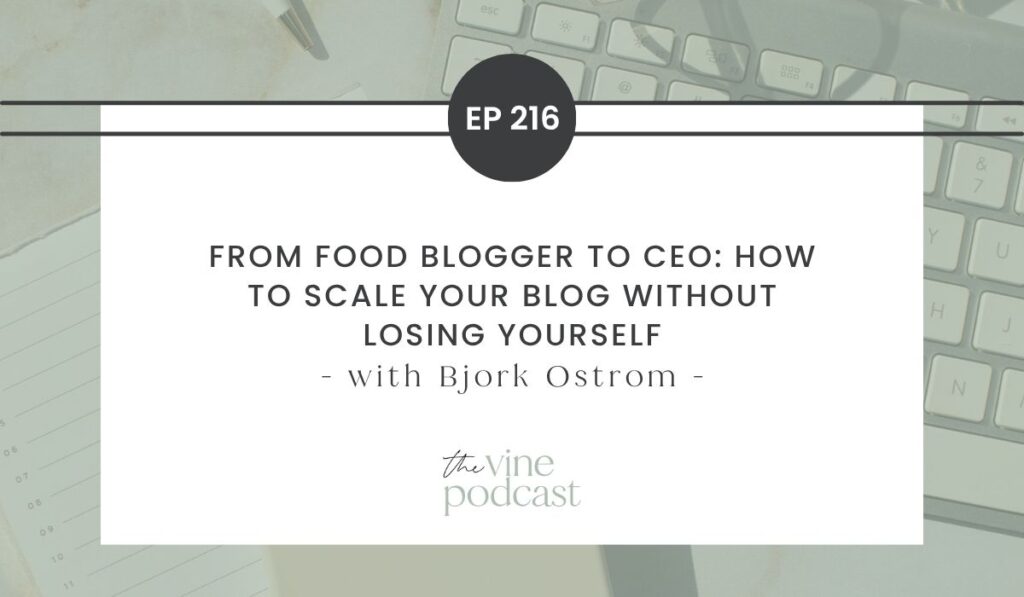Do you ever feel like you’re drowning in your own success? One minute you’re celebrating hitting your first monetization milestone, and the next you’re overwhelmed by the endless demands of growing a food blog. If you’ve ever wondered how to scale your business without sacrificing your sanity or the creative work you love, you’re not alone.
Recently, I had an incredible conversation with Bjork Ostrom, the business mind behind Pinch of Yum and Food Blogger Pro, about this exact challenge. Over the past 15 years, Bjork and his wife Lindsay have built not just one successful food blog, but an entire company of companies under their parent brand, TinyBit. Their journey from a simple recipe website to a multi-faceted business empire offers invaluable insights for any food blogger ready to think like a CEO.


The Great Transition: From Maker to Manager
One of the most important concepts Bjork shared is what he calls the “maker to manager transition.” As food bloggers, we start as makers – we’re artists creating content that captures attention through our unique voice, photography skills, or understanding of SEO. We’re essentially digital artists, much like painters or musicians.
But here’s where it gets tricky. The natural advice for any growing business is to scale, build teams, and create systems. While this can be incredibly successful, Bjork warns that many creators wake up one day running a business they no longer enjoy.
“People who are really good at a skill, have a really specific ability to create in a certain way, really love the work that they are doing, slowly evolve into having this business that they don’t actually like,” Bjork explains.
Two Paths Forward
Before diving into team-building, Bjork suggests considering two distinct paths:
The Company of One Approach Sometimes the best solution isn’t to scale at all. Paul Jarvis, author of “Company of One,” advocates for keeping your business simple and solo. This path won’t be the most efficient or the biggest, but it can be a perfect fit for creators who want to stay close to their craft.
The CEO Mindset For those who want to build and scale, embracing the manager role means learning an entirely new skill set. It’s important to recognize that delegation and team management are skills that require practice – you won’t be good at them immediately.
Starting Your Delegation Journey
If you’re ready to start building a team, Bjork offers a surprisingly simple framework to get started.
Step 1: Create Your “Do” and “Don’t Do” Lists
Make two columns:
- Things I Do: Everything you want to keep doing
- Things I Don’t Do: Tasks you’re currently doing but shouldn’t be
From your “don’t do” list, identify what still needs to happen versus what you can eliminate entirely. Some tasks you’ve been doing might not actually add value to your business.
Step 2: Start Small and Strategic
Begin with 5-10 hours per week of contractor work. Focus on tasks that are furthest from your core creative work. Social media posting, Pinterest management, or basic administrative tasks are great starting points.
Step 3: Leverage Your Audience
As creators, you have a built-in advantage – your audience already understands and appreciates what you do. Post a job description on your Instagram stories or create a simple form for applications. You’ll often find capable, motivated people who are looking for flexible work.
Step 4: Use the 10-80-10 Framework
Dan Martell’s concept, which Bjork swears by:
- 10%: You spend 10% of your time setting up and explaining the project
- 80%: Your team member executes the work independently
- 10%: You spend 10% of your time refining and finalizing
This approach helps you stay involved without micromanaging every step.

Advanced Delegation: The Art of Intentional Ignorance
As your business grows, you can move toward what Bjork calls “radical delegation” or “intentional ignorance.” Think of it like owning stock in Apple – the company grows and makes money while you’re completely uninvolved in daily operations.
This level of delegation requires:
- Aligned Incentives: Consider profit-sharing or performance bonuses so your team benefits from business growth
- Clear Vision: Your team needs to understand not just what to do, but why they’re doing it
- Trust: You have to be genuinely okay with not controlling every detail
The Philosophy That Changes Everything
Perhaps the most profound insight from our conversation was Bjork’s approach to reframing success. He keeps a quote from C.S. Lewis on his desk: “To be happy at home is the end of all human endeavor… the sun looks down on nothing half so good as a household laughing together over a meal.”
For Bjork, true success is defined as “a healthy body, a clear mind, and a house full of love.” Everything else – including business growth and revenue – serves these higher purposes.
This reframe is crucial for sustainable growth. When your business serves your life rather than consuming it, you make different decisions about what’s worth your time and energy.
Practical Tips for Daily Improvement
Bjork’s philosophy of being “1% better every day forever” isn’t about massive overhauls. Instead, focus on:
Process-Based Improvements
Look for small friction points in your business and systematically eliminate them. Bjork created a custom ChatGPT to handle sponsorship proposal creation – a task he dreaded that was holding up potential revenue.
Morning and Evening Routines
Create systems that set you up for success. Bjork has recurring tasks in his task manager that remind him of his most important daily activities, from drinking water to reviewing priorities.
Realistic Expectations
Sometimes burnout isn’t about productivity – it’s about trying to do too much. Before optimizing your schedule, honestly assess whether your expectations are realistic for your current season of life.
Key Takeaways for Food Bloggers
- Recognize that delegation is a learnable skill – don’t expect to be good at it immediately
- Start with tasks furthest from your creative core – protect what you love most about your work
- Use your audience as a hiring advantage – your followers already understand your business
- Focus on aligned incentives – help your team succeed when you succeed
- Define success beyond business metrics – know what you’re really working toward
- Embrace the long game – people underestimate what they can accomplish in a decade while overestimating what they can do in a year

The Bottom Line
Growing from a solo food blogger to a CEO doesn’t mean you have to sacrifice the creative work you love or the life you want to live. It means getting intentional about what deserves your personal attention and what can be handled by others.
As Bjork reminds us, the goal isn’t just to build a bigger business – it’s to create work that feels rewarding while building the life you actually want. Sometimes that means staying small and solo. Sometimes it means building a team. The key is choosing your path intentionally and being willing to adjust as your priorities and circumstances change.
Remember, what we’re building is meant to be a long-term game. Show up consistently, get a tiny bit better every day, and trust that you’ll eventually find the sweet spot where rewarding work meets sustainable income.

Bjork is the chief tech consultant / business advisor / taste tester at Pinch of Yum, the food blog created by his wife, Lindsay. Day-to-day, you’ll mostly see him around Food Blogger Pro, the membership site and podcast they created to share what they’ve learned with other food bloggers. Bjork and Lindsay live in Minnesota with their daughters Solvi and Lena, and dog Sage. He can usually be found with a coffee in hand and is a terrible chef.

ready to take your food blog to the next level?
We work with food bloggers looking to stand out of the crowd through custom brand and website design.
topics
Browse through some of the topics we discuss on the blog, then click over to see all the posts within that topic!

hey friend, i’m madison
Food blogger turned web designer
I’ve been where you are. Growing fast, feeling overwhelmed by the tech side of things, and realizing that somewhere between hitting 100k sessions and launching that new revenue stream, the foundations of your business got left behind.
I started out as a food blogger, so I get it. The constant juggling. The feeling that your site doesn’t match who you’ve become. The frustration of working way too hard while your brand and tech hold you back.
That’s why I created Grace + Vine Studios—to help monetized food bloggers like you finally catch up. Whether it’s your branding, your website, or just figuring out what the heck comes next, I’m here to help you build a business that reflects where you are now and actually improves your life instead of consuming it.
